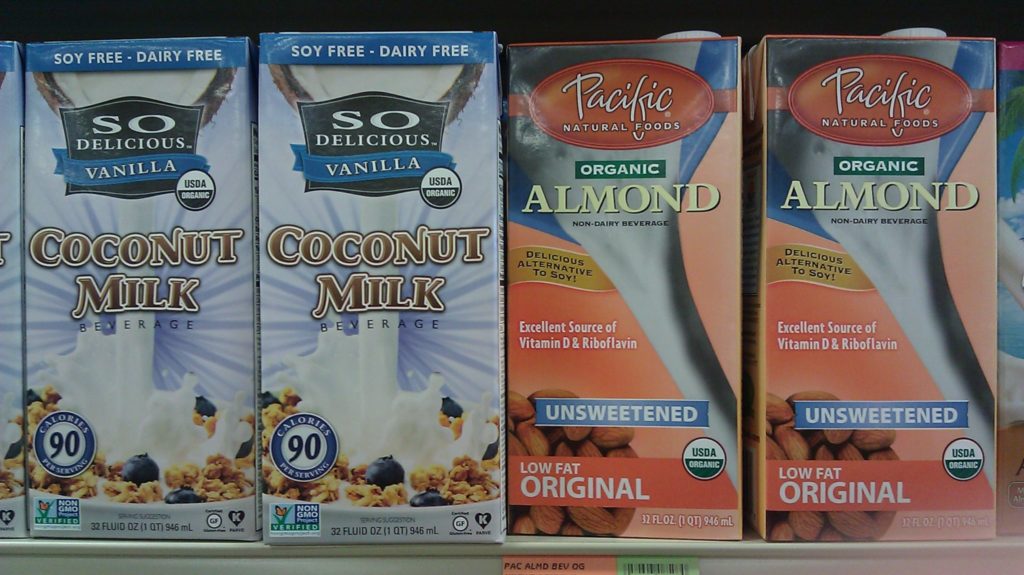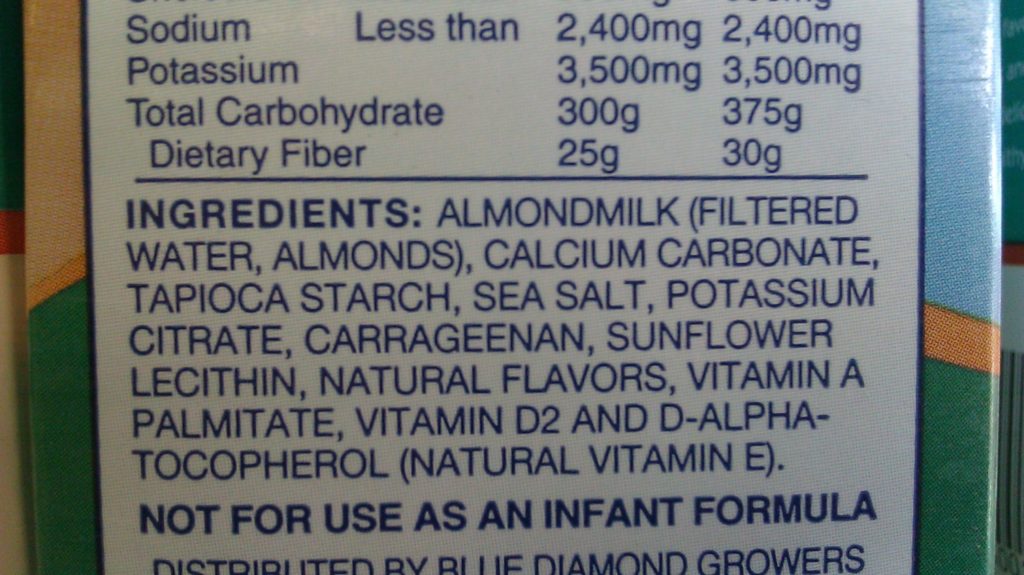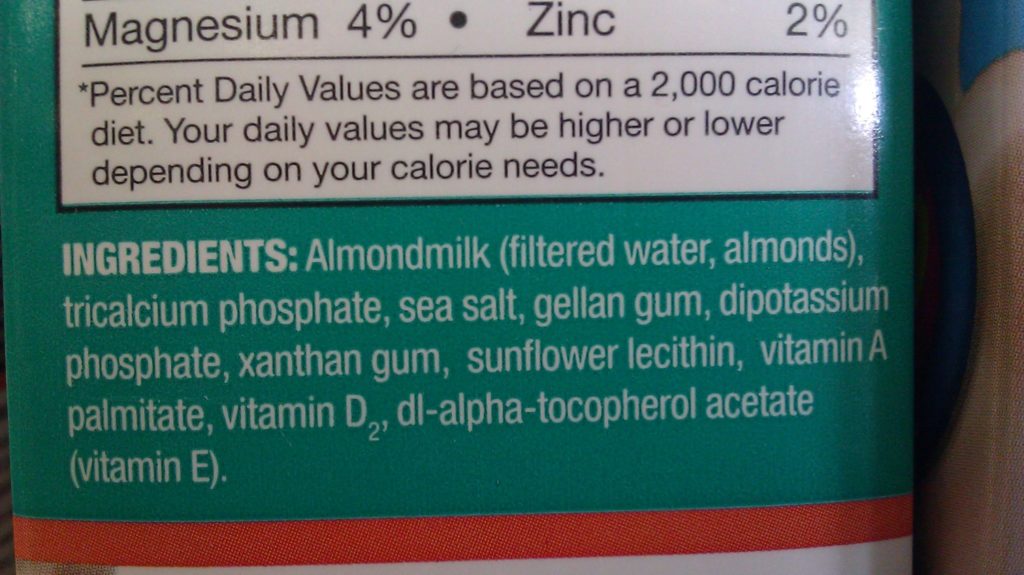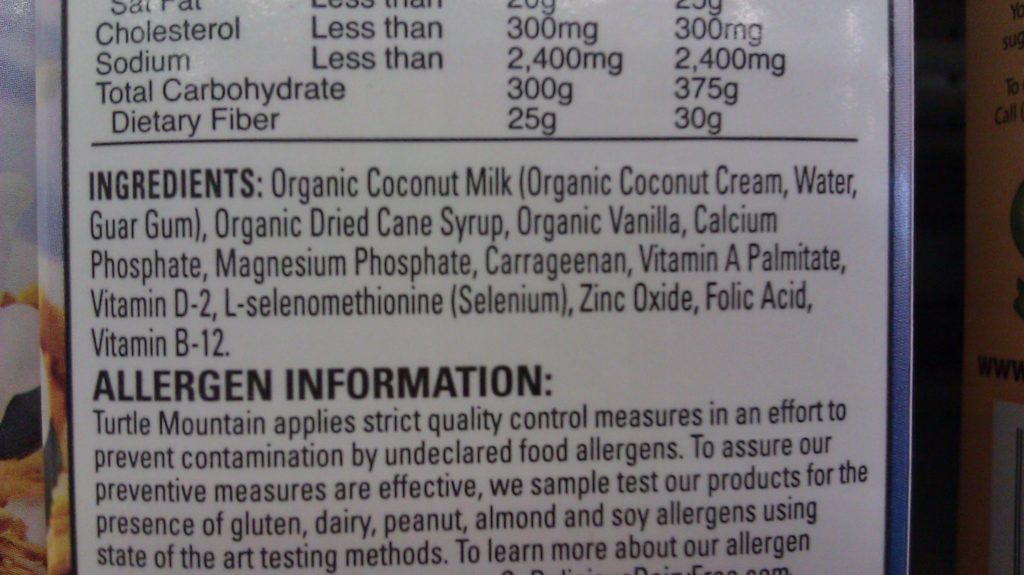 Organic coconut milk and almond milk are common purchases at the health food store by those with dairy allergies. Usually, these people are savvy consumers who know enough nutritionally to avoid soy milk with its endocrine disrupting isoflavones and gastric inflaming phytates. Rice milk is also steadily declining in popularity as it is really not much more than a glass of sugar water nutritionally speaking.
Organic coconut milk and almond milk are common purchases at the health food store by those with dairy allergies. Usually, these people are savvy consumers who know enough nutritionally to avoid soy milk with its endocrine disrupting isoflavones and gastric inflaming phytates. Rice milk is also steadily declining in popularity as it is really not much more than a glass of sugar water nutritionally speaking.
Organic, unsweetened coconut milk and almond milk in cartons seem like great alternatives at first blush, but are they really as “healthy” as people believe?
Let’s take a look at the labels. I was shocked at what I found.
Check out the labels of the three brands I photographed. I checked all the brands, by the way, and they all contained the same dangerous additives I’m about to describe.

First, Vitamin A Palmitate is added, the synthetic version of Vitamin A. I personally avoid synthetic versions of Vitamin A like the plague. Every single multi-vitamin I’ve ever examined contains some form of synthetic A, including the so called “whole foods” multis.
Synthetic vitamins are the chemical mirror images of the real, natural versions. They can cause imbalances over time. Even small amounts of the synthetic fat soluble vitamins like Vitamin A can prove toxic and should be strictly avoided!
The Organic Consumers Association warns that isolated vitamins such as those produced synthetically cannot be recognized or metabolized by the body in the same way as the natural version.

Large doses of natural vitamin A are well tolerated by the body as established by researchers decades ago, however. Traditional diets contain 10 times or more of the RDA of this nutrient with no ill effect. However, synthetic vitamin A is associated with birth defects and bone fractures. It has no benefit in the diet whatsoever.

The second really bad additive in these organic cartons of coconut milk and almond milk is Vitamin D2. Vitamin D2 is a form of the wonder vitamin that you should take great pains to avoid.
In all known cases of Vitamin D toxicity where the dose was intentional, Vitamin D2 was the culprit. By comparison, Vitamin D3 is much less toxic and requires an enormous or even an accidental dose to produce any toxic effect.
Vitamin D2 is manufactured industrially by irradiating yeast. It is dangerous for D2 to be added to any food product particularly if this product would be given to children, where toxicity symptoms would appear at much lower dosages.
None of the store brands of cartoned coconut milk or almond milk were free of these dangerous and synthetic versions of the fat soluble vitamins!
Notice also that carrageenan is present in 2 of the 3 products as well! Dr. Andrew Weil has been telling people to avoid carrageenan since 2002.
Carrageenan is so toxic and inflaming to the human digestive system that this food additive is formally classified by the International Agency for Research on Cancer (part of the World Health Organization) as a potential human carcinogen.
In my view, it would be a mistake to purchase and consume these items. They are in no way health promoting or beneficial, particularly for growing children!
Healthy Alternatives to Coconut Milk and Almond Milk in Cartons
Coconut milk and almond milk should be healthy and they can be if they are produced at home without these dangerous additives. I wrote an in depth post on how to easily make these nondairy beverages yourself. This recipe for wild rice milk is a good option as well.
Believe it or not, even organic coconut milk in BPA free cans would be a better alternative to cartons of coconut milk based on my label inspection!
Check out my video on homemade coconut milk and my article on how to make healthy DIY almond milk, fermented to add probiotics and enzymes to boost immunity and improve digestion.
Sarah, The Healthy Home Economist
Sources
From Seafood to Sunshine: A New Understanding of Vitamin D Safety







Have you ever seen Almond’s drink from Bjorg? It is completely organic, without aditives. And very tasty too!
where we buy coconut milk ?
The only good coconut milk is the kind in bpa free cans that have 3 or fewer ingredients such as Native Forest brand: coconut, water, guar gum. No carageenan or any additives. The ones in the cartons say “beverage” on them for a reason, they aren’t just plain coconut milk
I think it’s important to note two things:
Firstly, this is over 2 years old now. Secondly, products these days are far more natural.
Lets compare Almond Milk I’m drinking right now!
INGREDIENTS: Filtered Water, Almonds, Mineral salts (tricalcium phosphate, sodium bicarbonate), lecithin, salt, carrageenen (vegetable gum).
The worst ingredient this has is Carrageenen, which studies have shown as a carcinogen in high doses. However, it has an incredibly short half life, and assuming that it had the maximum legal limit of Carrageenen in it, you would have to drink 18 Litres in 4 hours to even be at ‘entry level risk’
Yes, making your own Almond Milk is healthier… no doubt about it. But you don’t have to do that if you don’t want to. It’s not as unhealthy these days as this article states.
Have you googled carrageenan….. Really nasty stuff.
I have found that the problem with all nuts and nut milks is that they are very low in the essential amino acid lysine and very high in the non-essential, and competing, amino acid arginine. This amino acid imbalance causes many problems! Also, the phytic acid in both almonds and coconuts inhibits enzymes needed to break down the amino acids phenylalanine, tryptophan and tyrosine. Phytic acid also binds minerals, such as manganese. The combined effect of these problems would be not only physical but mental as well.
I apparently can’t digest the casein in cow’s milk, although long-aged cheese and whey seem to be fine, but goat’s milk is no problem, as well as sheep’s milk yogurt, so these are good alternatives to cow’s milk for some people. By the way, dairy products have the highest lysine to arginine ratio of any foods, so they are very helpful to balance out grains, which are also much higher in arginine than lysine.
I went to the website you cited (Organic Consumers Association) and could not find anything negative that was specific to Vitamin A Palmitate. I did further research and found that Vitamin A Palmitate or retinal palmitate is naturally occurring in animal sources, where as Vitamin A or carotenoids is found in fruits and vegetables. I do agree that Vitamin A Palmitate is used in vitamin supplements and can be consumed to the point of toxicity, but I do not believe that the mere presence of it in products should keep people from buying products that are healthy.
Adding synthetic vitamins to nut and coconut milks is a practice that I can do without, and add coconut nut water to that mix.
FYI: Soy only causes a problem in “ISOLATED FORM”, real non gmo soy contains PHYTO ESTROGENS that are 10,000 times weaker than estrogen and actual help the body by attaching to receptors sites, mimicking real estrogen. So please don’t write about soy if you only rewrite, false facts made by other writers who didn’t have the proper information to begin with,.
Great Article. I completely agree. These synthetic vitamins and additives makes these quite unhealthy. I have a very simple and economical way to make your own nut or seed milk and you don’t need any special equipment. Hope this will help someone: https://www.youtube.com/watch?v=k8d4ZW_VHzo